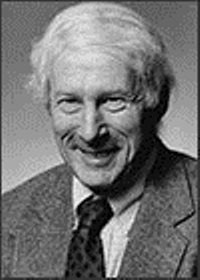 Renowned education demographer Harold L. “Bud” Hodgkinson died earlier this month at age 85.
Renowned education demographer Harold L. “Bud” Hodgkinson died earlier this month at age 85.Thirty years ago I was asked by Gordon Ambach, Commissioner of Education for the state of New York, to become a member of a Board of Overseers to assist the Regents in their oversight of Regents External Degree Program, a college which was founded by the Board of Regents in 1971. The members of the Board of Overseers consisted of educators and other professionals from around the United States.
At our first meeting in July 1985, I met Harold “Bud” Hodgkinson for the first time. Those of us who did not know Bud quickly learned that he was the guru who was constantly analyzing demographic trends and how they affected education at all levels.
His contributions to the work of the board over the years and through its transitions to an independent private college chartered by the state Board of Regents was stellar. The new college took on its present name from the state motto and became Excelsior College.
In many ways, Bud was much like a highly talented professor conducting a continuous postdoctoral seminar in which he constantly raised the issues of how the changing demographics of the nation and the world would affect the work of education. Always having at hand his handwritten visuals containing a cornucopia of data, he would use an overhead projector and then launch into his masterful explanations of complicated data to explain to the board how the populations of the world were changing and affecting their environment.
He always was able to use colorful examples to illustrate what he was trying to teach us. At every meeting I learned something from Bud that I could take back to my own work.
Moreover, I was able to entice Bud to come to New York University to lecture my master’s and doctoral students in higher education administration. When he spoke, other faculty members and their classes joined in the audience to understand what he had to teach. For someone who generally was rather quiet and far from flamboyant, Bud always had his audience spellbound.
Finally, having the privilege of knowing Bud Hodgkinson as a colleague and as a friend whose work made me a better college administrator and professor has enriched me.
Joshua Smith is Board Chair Emeritus of Excelsior College and Emeritus Professor of Higher Education at New York University. He has also been President of the Borough of Manhattan Committee College, CUNY, Chancellor of California Community Colleges, and President of Brookdale Community College, Lincroft, N.J. He is also a Past Board Chair of the American Association of Community Colleges.
From Richard Yelp, CEO of the American Counseling Association:
It was many, many years ago when I began reading about Bud Hodgkinson’s work. The fact that he was one of the world’s leading education demographers, and that he could take very complex data so that even I could understand and apply it was even more amazing. So, when I had the opportunity to begin serving with him on the Excelsior College Board of Trustees a little over 10 years ago, I was excited to learn more about his ground-breaking work.
While he was still able to make the information understandable (something that I deeply appreciated), I also got to know Bud’s humor, his caring for those facing life’s challenges, and his love of overhead transparencies (even long after PowerPoint and LCD projectors became presentation standards).
In his own way, Bud used his intellect, ability to communicate, and grasp of social issues to teach others why we needed to care about certain statistics. Those statistics described the human condition and Bud knew that if we could all understand those things just a little better, that we could help him fight for better education and human services for everyone.
From William E. Cox, president and CEO of Diverse: Issues In Higher Education:
I think about Bud Hodgkinson quite frequently as I have for many years. Bud leaves a lasting impression on those he has met.
For me it had to be in the mid-to-late ’70s when I first met Bud. I was working for the Department of the Air Force at the Pentagon. And I believe it was at One Dupont Circle at one of those American Council on Education meetings where I heard for the very first time Bud’s briefing on demographic imperatives.
Dr. Harold Hodgkinson had that unique ability to convert relevant research and statistics into consumable, readable and useful information. His quote, “It literally costs about seven times as much to have somebody at the state pen as it does to have somebody at Penn State” is a poignant example. The man was way, way ahead of his time. Bud was calling or telling us what the future of higher education and this country held for all of us.
Diversity in higher education continues to be a major concern for college presidents, the federal government, state and local governments, to higher education associations and too many others. Technology never caught up with Bud as he favored an overhead projector for the slides he would share with us. Nothing sophisticated, just plain and simple was his way of getting things done.
Years later, Bud Hodgkinson and I ended up at Excelsior College where we both were trustees. It was at these meetings that we had time to engage in private conversation not only about business but also personal aspects of our lives. On every occasion where I was in the company of Bud Hodgkinson, he impressed me with the enthusiasm that he shared for our work and the audiences that comprise the Diverse readership.
We have lost an educator’s educator. Few had the grasp of the real world of American education like Bud Hodgkinson and he devoted his career to making it a better place ― especially for the underserved and underrepresented.















